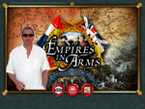delatbabel
Posts: 1252
Joined: 7/30/2006
From: Sydney, Australia
Status: offline

|
Yes, it does affect play balance.
I'm going by the board game numbers here -- I'm obviously more familiar with that than EiANW.
In the board game, assuming that France has committed reasonable numbers of ships to the North Sea / Bay of Biscay ports, GB can usually spare about 1/3 of its fleet to the Mediterranean. That's about 40 ships. Spain will usually have that number or more there, but the Spanish fleet (if it sets to sea) is vulnerable to a quick attack from the GB home fleet. Turkey has 21 ships, not usually enough to go toe to toe with GB in the mediterranean, unless it gets help from France and/or Spain. Even with just the French mediterranean fleet (which often isn't much), the Turks will have a hard time going toe to toe with GB in just naval battles -- and since Spain and Turkey don't always see eye to eye as far as the division of African nations is concerned, the Turks usually have Spain to contend with at least in the Western Med.
The way that Turkey can assist France is to transport French corps about the place, since France and GB are usually at war, and Turkey and GB are often not. However, in the case that the French fleet has been neutralised and/or blockaded, Turkey has to go it alone against the GB Mediterranean fleet.
If the threat of Turkish fleets being attacked and sunk by GB fleets exists, i.e. if it transports French corps and the game rules allow that to happen, then Turkey will usually not risk transporting French corps. It costs ships that the Turks can't afford to rebuild, and it costs PPs which are always at a premium. Nelson and a single 30 ship fleet can usually take on the entire Turkish navy (often only 1 or 2 fleets) and win every time, and so each time that happens it's +2PP GB, -1PP Turkey, and a French corps that either dies or returns to port.
If GB has to declare war on Turkey to gain the +2PP then GB will probably not do so, because it's -4PP to declare war, so it's net -2PP for GB. That pretty much removes the threat of Turkish fleets being attacked, and therefore allows the French a much more free hand in the Mediterranean, as it can usually rely on (often neutral) Turkish fleets to transport its corps.
I think that there are a number of rule changes in EiANW that unbalance the game in favour of France and against GB -- the allied fleets bug of course being the major culprit, but also the channel crossing arrow, and the limitations on combined movement & mechanisms for loaning money. This is probably the most insidious however because it removes the ability for GB to use its naval power to keep France's potential allies at bay, and prevent them actively assisting French invasions of the Italian and African coasts. I can even see a situation where French corps were transported from Marseilles by Turkish fleets to the Austrian Adriatic ports, which in reality would have been ludicrous (especially during the years when Nelson was stationed in the Mediterranean) -- the brits were notorious for "inspecting" neutral shipping, and while they didn't always press-gang all of the crews of vessels suspected of carrying contraband, even neutral (often American) ships carrying cargo suspected of being destined for French ports were boarded and taken as prizes without question, and even a few French soldiers found hidden on board could result in ships being sunk and/or officers being arrested or hung as spies.
In fact I'd go so far as to say that the board game doesn't go far enough -- it doesn't allow you to attack (without a declaration of war) neutral fleets carrying depots that are supplying French corps, which I am aware of happening at least once during the Mediterranean campaign. Even neutral ships carrying "contraband" supplies to French ports were often attacked and/or sunk without a state of war existing.
If you have to make a declaration of war to attack neutral shipping carrying enemy contraband, at least remove the PP cost. Possibly I would even increase the size of the GB starting fleet to reintroduce that element of threat against neutral shipping potentially aiding the French -- it appears to me that in EiANW, once GB has put down enough ships to blockade the French and Dutch fleets, it doesn't really have enough ships left to effectively patrol the Mediterranean, which doesn't truly represent the military situation in either 1805 or 1792 (and certainly not post-Trafalgar, when it probably had sufficient naval overkill to blockade every port on the planet and keep up reasonable sized patrols).
_____________________________
--
Del
|
 Printable Version
Printable Version







 ) and force a declaration of war.
) and force a declaration of war. 


 New Messages
New Messages No New Messages
No New Messages Hot Topic w/ New Messages
Hot Topic w/ New Messages Hot Topic w/o New Messages
Hot Topic w/o New Messages Locked w/ New Messages
Locked w/ New Messages Locked w/o New Messages
Locked w/o New Messages Post New Thread
Post New Thread